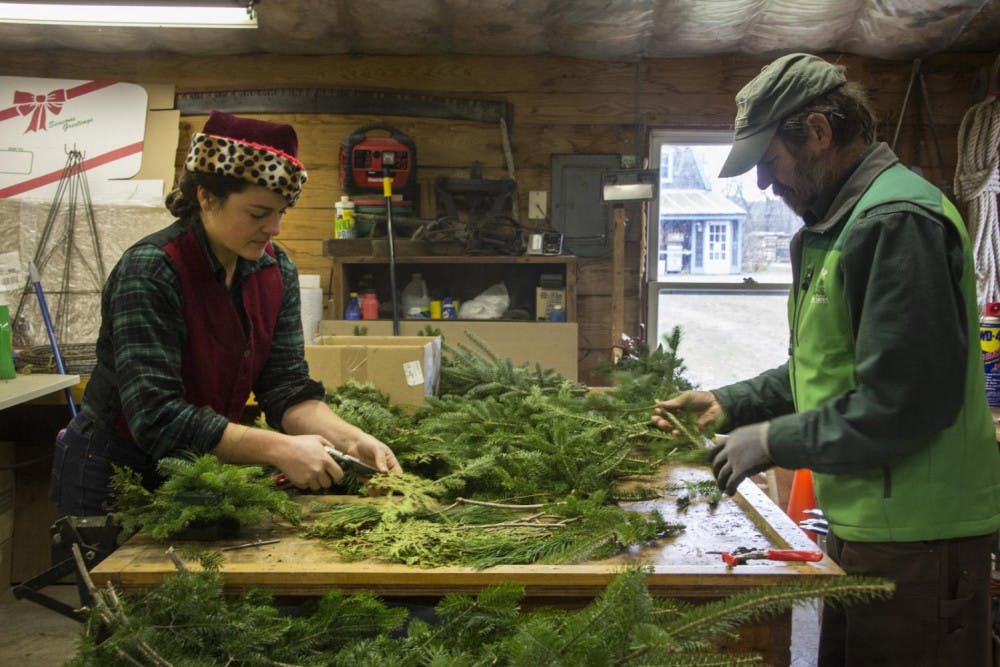As the holidays descend on Middlebury, the Werner Christmas Tree Farm has gone into overdrive to prepare for its 26th season. The owners, Cheryl and David Werner, started the farm after David’s father, Fred, who had a passion for planting trees, gave them a batch of Scotch pines.
The family business has since trickled down to Fred’s grandchildren, who now often come back to Middlebury between Thanksgiving and Christmas to serve as the farm’s elves as sales go into high gear. Amanda Werner, a Skidmore College graduate and full-time cheesemaker at Champlain Valley Creamery, is the only one of Cheryl and David’s children who helps year-round.
The farm consists of 25 acres near the couple’s home, with another 10 acres in Lincoln, Vermont. The farm aims to sell around 2,000 trees each year while having 35,000 planted trees in various stages of growth. At the time of Fred Werner’s gift of pines, Christmas tree farms were ubiquitous across the region. An Addison County Christmas Tree Growers Association, which has since disbanded, had a substantial membership base.
“We plant in spring, and we always plant more trees than we end up cutting off,” Amanda said. “In the summer months we’ll shear the trees, using a long knife like a machete. We walk around them and swing the knife, knocking off the tips of the branches to outline the shape we want.”
The undulating nature of the Christmas-tree industry calls for a spike of 10 to 12 workers during peak season, while only the immediate family works during the rest of the year. In the coming month, the family will divide the workload, with Cheryl Werner handling checkout, Amanda Werner making wreaths and David Werner creating garlands.
On a typical December weekend, the farm can anticipate around 200 people searching for Christmas trees. Equipped with measuring sticks and bow saws, some customers like to cut their own, while others choose from the selection of pre-cut trees. The trees are not distinctly organized by height, but workers direct customers to fields that typically have certain height ranges.
“We say that most people have eyes taller than their ceiling,” Amanda Werner said. “They may think a six-foot tree sounds like a good height but then are drawn to trees closer to eight feet in height.”
David Werner, who is a full-time woodworker the rest of the year, runs most of the business operations in his workshop on the property during the holiday season. The decorated barn is stocked with maple syrup and garlands but has wood clamps and tools peeking out behind the garlands on the walls. Cheryl Werner occupies the rest of her time as a teacher in plant, animal and mechanical sciences at the Hannaford Career Center.
Amanda Werner hopes to keep the family business going when her parents retire, possibly in the next few years. She also hopes to add new programs and activities to the farm.
“It’d be really fun if we could have a build-your-own-centerpiece workshop,” she said. “I don’t know if we’ll ever have enough time and people to do this, but we do have a sleigh, and one of the horses knows how to pull it. We would also need snow for that, though.”
Although entirely a retail operation today, the farm used to ship trees wholesale. The appeal of a true Vermont pine tree drew orders from as far as the Caribbean. Amanda fondly remembers packaging trees for Bermuda nearly 15 years ago after a heavy snow. Transported in the bottom of a large ship, the trees were unwrapped hundreds of miles away with the snow still intact on them.
As climate change becomes more apparent each year, the Werners have noticed less snow and later freezes.
“Obviously, we’ll have to deal with warming more and more in the future,” Amanda Werner said. “This year was a little bit easier for us because we had that cold snap early in November and we need three hard freezes before we can do any harvesting. The freezes trigger a sort of hibernation of the trees [that] sets the needles.”
To handle the warming climate, the Werners have shifted most of their brush cutting up to their mountain fields. These areas get colder earlier and allow for the first harvesting of the season. With a warming Vermont climate, the farm may have to move more of its production to a higher elevation. However, the lack of snow has not prevented customers — both local and out-of-state — from flocking to the farm as soon as Thanksgiving leftovers start to diminish.
According to David Werner, the lack of snow has meant a steadier stream of customers during the month of December, rather than a swarm at the first sight of flurries. With snowy days farther apart, people are no longer willing to wait for the increasingly rare snow days.
For more information on the Werner Tree Farm, visit their website at www.wernertreefarm.org.
Werner Christmas Tree Farm Gears Up for Holidays

Comments



